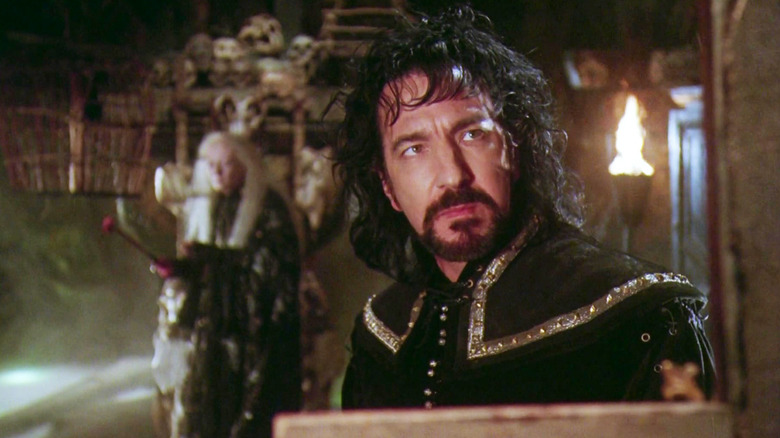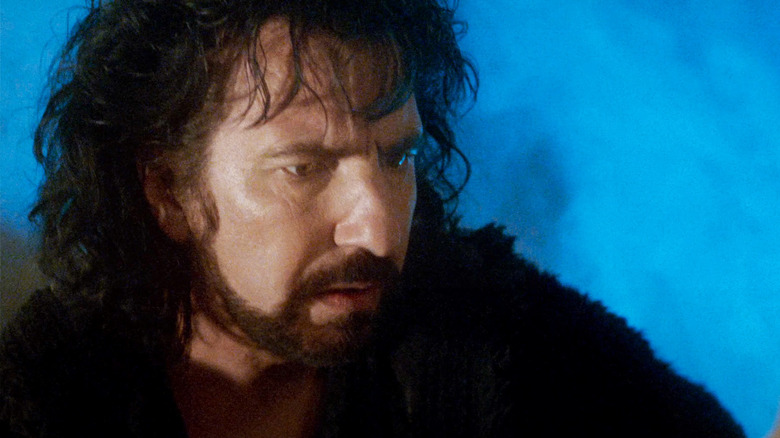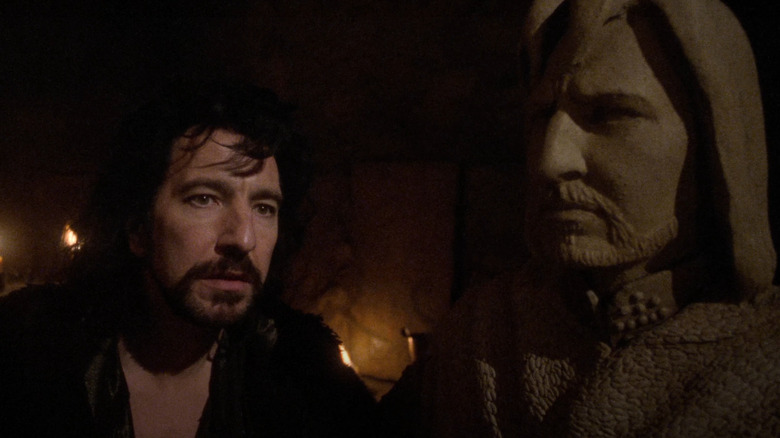Alan Rickman Secretly Did His Own Script Editing On Robin Hood: Prince Of Thieves
Before Batman, Bond, and seemingly everything else got the gritty reboot treatment in the early 2000s, Hollywood tried a similar thing with none other than Robin Hood. Unfortunately, 1991's "Robin Hood: Prince of Thieves" didn't quite manage to pull off its attempt at a rebrand of the classic English hero. In fact, these days it's remembered more for Kevin Costner's magnificent mullet and what co-star Alan Rickman called its "glorious mixture of accents."
That said, it's not like there's nothing to love about "Robin Hood". The score's not bad and it was a cool idea to try to reimagine Robin Hood for the '90s. It just didn't really work out in the end, with the movie failing to garner any critical praise of note despite raking in an impressive £390 million at the global box office.
But if there's one undeniably great thing about the movie, it's Rickman, whose performance as the villainous Sheriff of Nottingham won him a BAFTA for Best Actor in a Supporting Role. The late actor has been a highlight of multiple films but in "Robin Hood" he's often the only thing that makes it watchable. Having only been in a handful of movies by 1991, including his legendary turn as international terrorist Hans Gruber in "Die Hard," Rickman was still navigating his transition from the theater to the big screen. But his scene-stealing performance in Kevin Reynolds' medieval adventure represents a man completely at ease. Rickman is so effortlessly over the top it's as if he saw the whole thing as nothing more than a bit of a fun between his other projects. Which, as it happens, is pretty much the truth.
Robin Hood had a 'terrible script'
Rickman never seemed like the type of guy to get suckered into doing a bad movie. He always appeared to take a thoughtful approach to his craft and there's no way that he would have found himself on the set of "Robin Hood" if he didn't want to be there. While much of his appearance in the film was likely driven by his desire to break further into Hollywood with another big-budget film, it seems his healthy disdain for the ridiculousness of the script may have also pushed him to agree to it in the first place.
During a BAFTA interview, Rickman recalled asking his friend, playwright and screenwriter Peter Barnes: "will you have a look at this script, because it's terrible?" Barnes did indeed have a look, and even gave Rickman some ideas for lines to punch up the screenplay. As the actor recounted:
"He said 'well, here where it says you're coming down the corridor and you're wiping the scar off of the statue — you should have a wench in a doorway, and then you should say, 'You. My room, 10.30,' and then turn to the other wench and say, 'You, 10.45'.'"
Rickman then turned to his longtime friend Ruby Wax, who he says came to his house and added a tag to Barnes' "10.45" line by suggesting: "And bring a friend." When Rickman told Reynolds about the new lines, the director apparently gave him free rein to add in whatever he liked. As the actor recalled it, "Nobody knew this was happening except him. And I knew it had worked because as I cleared the camera I saw about 80 members of the crew just go [laughing gestures]."
Rickman loved a script change
Rickman seemed to have a habit of making changes to scripts. He was the one who came up with the idea to have Hans Gruber wear a suit in "Die Hard," and the producers begrudgingly made the change. In that case, just as with "Robin Hood," Rickman made the whole thing better with his additions. But unlike in "Die Hard," where there are multiple things to love, "Robin Hood" really needed Rickman to save it.
Roger Ebert obviously picked up on the actor's drive to take the initiative, saying "Rickman's performance has nothing to do with anything else in the movie and indeed seems to proceed from a uniquely personal set of assumptions about what century, universe, etc., the story is set in." Ebert was right to notice the actor had gone somewhat off-book with his performance, but that was really the only way he was ever going to agree to do it in the first place. Even with his unique take on the Sheriff of Nottingham, Rickman seemed to be aware of how disappointing "Robin Hood" was. Something about the droll way he says "good" when Bobbie Wygant tells him she enjoyed the film suggests to me that even with his additions he knew the movie wasn't going to become a classic any time soon.
But as he went on to say, the film wasn't "trying to take itself seriously or lecture anybody about a piece of history." It was a Hollywood take on Robin Hood and Rickman knew to play it that way. His performance might not have been enough to save it from being remembered as a bit of a misfire, but it was enough to keep his stellar record of outstanding performances intact.


